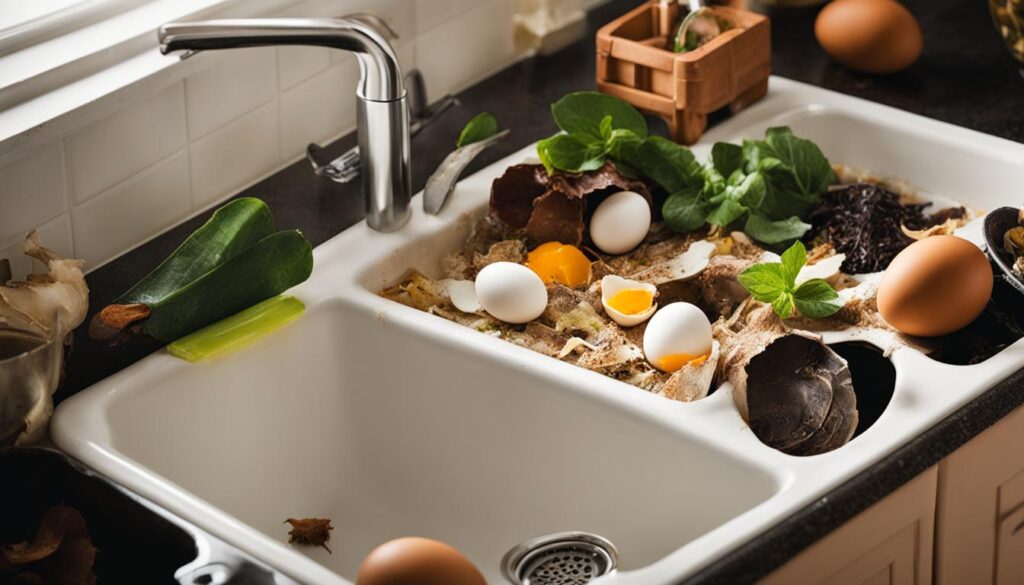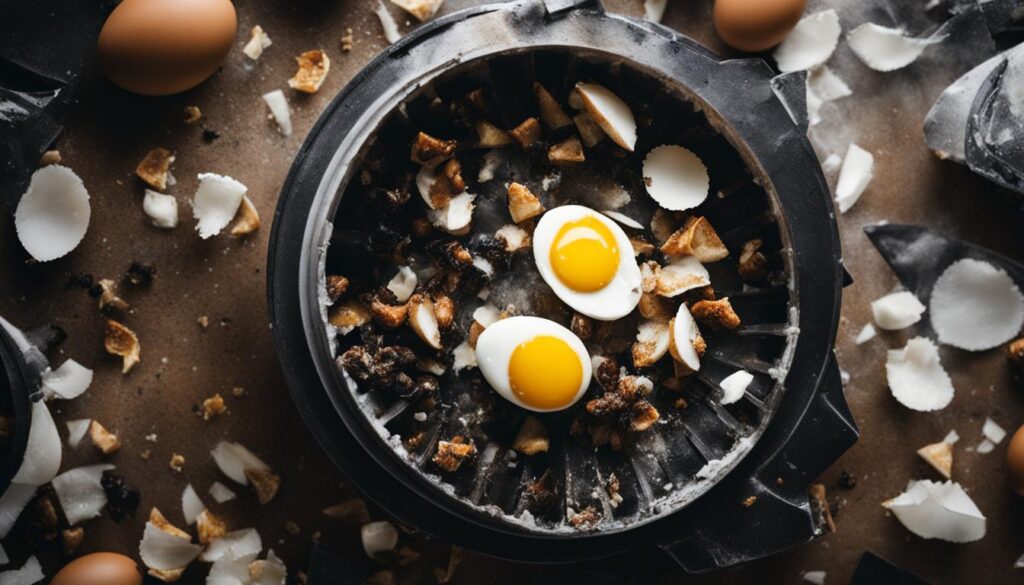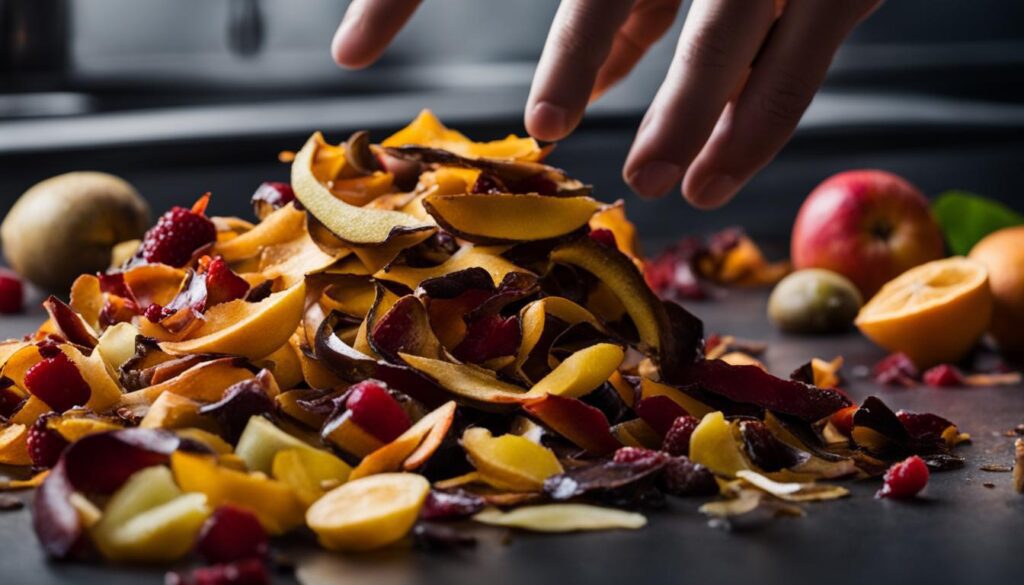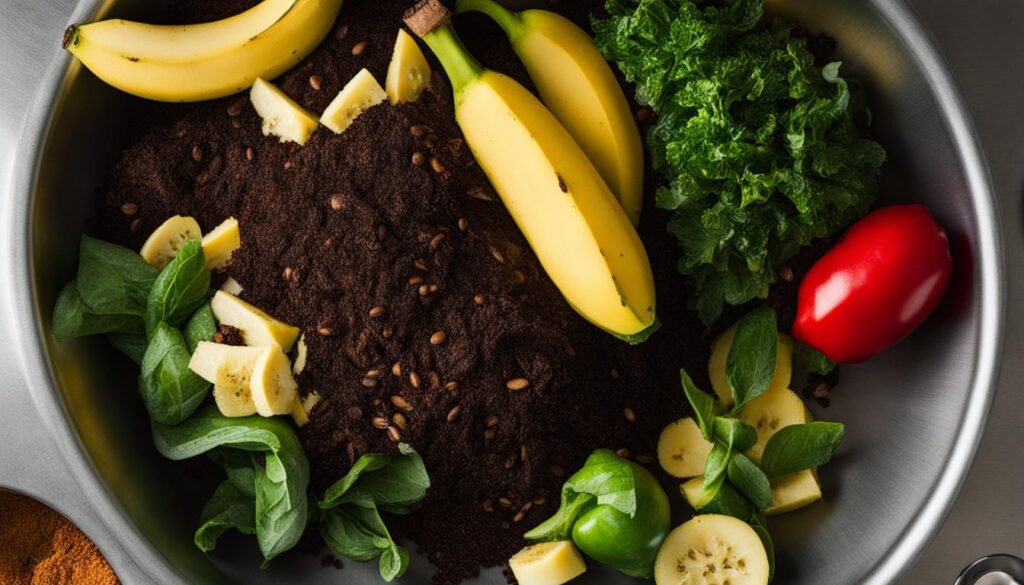Garbage disposals are powerful machines that can efficiently grind up food scraps and whisk them away down the drain but can egg shells go in a garbage disposal?. However, there are certain items that should not be put in a garbage disposal, including egg shells. While a shell or two might not cause immediate problems, a steady diet of eggshells can eventually lead to buildup and clogging in the drain. Egg shells do not break down as easily as other foods and can cause issues with the disposal blades and motor. It is best to dispose of egg shells in the trash or use them in compost instead.
Key Takeaways:
- Putting egg shells in a garbage disposal can lead to clogs and damage.
- Egg shells do not break down easily and can cause issues with the disposal blades and motor.
- Dispose of egg shells in the trash or use them in compost.
- Other items to avoid putting in a garbage disposal include coffee grounds, shellfish parts, starchy foods, big bones, oil, fat, and grease, fibrous produce and peels, and chemicals and paint.
- Safe items for a garbage disposal include produce scraps, fruit pits, meat and small bones, leftovers and cooked food, and ice.
What Can and Cannot Go in a Garbage Disposal?
Knowing what can and cannot go in a garbage disposal is essential for maintaining its functionality and preventing clogs or damage. Consumer Reports provides guidance on items to avoid putting in a garbage disposal to ensure its proper operation. Let’s take a closer look at what you should and shouldn’t dispose of in your garbage disposal.
Items to Avoid Putting in a Garbage Disposal
Coffee grounds: Coffee grounds can form a thick paste and clog the drain.
Shellfish parts: Clam and oyster shells are too hard and can damage the disposal.
Starchy foods: Rice, pasta, beans, and oatmeal can expand in water and pose a risk of clogging.
Big bones: Large bones can damage the disposal’s blades and motor.
Oil, fat, and grease: These substances can solidify and block the pipes.
Fibrous produce and peels: Celery, rhubarb, and other fibrous produce can clog the drain or cause issues with the disposal.
Chemicals and paint: Never pour chemicals or paint down the disposal as they can be harmful to the system.
By avoiding these items, you can prevent clogs, damage, and potential plumbing issues. It’s crucial to dispose of these substances properly to maintain the functionality of your garbage disposal.
Items That Can Safely Go in a Garbage Disposal
On the other hand, several items can safely go in a garbage disposal. These items include:
- Produce scraps: Apple cores, carrot ends, and other fruit and vegetable scraps can be disposed of without issue.
- Fruit pits: Peach, avocado, and other fruit pits can typically be ground up, but caution is advised as they can potentially damage the disposal blades.
- Cooked meat and small bones: These can be easily broken down by the disposal.
- Leftovers and cooked food: Non-greasy or fibrous leftover foods can be safely disposed of.
- Ice: Ice can be used to clean and sharpen the disposal blades.
Remember to use cold water while running the disposal and dispose of these items in small amounts to prevent clogs and maintain the proper operation of your garbage disposal.
| Items to Avoid | Items That Can Go |
|---|---|
| Coffee grounds | Produce scraps |
| Shellfish parts | Fruit pits |
| Starchy foods | Cooked meat and small bones |
| Big bones | Leftovers and cooked food |
| Oil, fat, and grease | Ice |
| Fibrous produce and peels | |
| Chemicals and paint |

By following these guidelines, you can ensure the optimal functioning of your garbage disposal and avoid potential plumbing issues. Remember to dispose of the right items in small amounts with plenty of water, while avoiding the substances that can lead to clogs or damage.
The Impact of Egg Shells in a Garbage Disposal
Egg shells can have negative effects on a garbage disposal system. Due to their brittle nature, egg shells can easily break into small pieces that can become tangled in the disposal’s blades or impeller, leading to blockages. Additionally, the thin membrane inside the shells can wrap around the blades or create a sticky blockage in the plumbing. This can result in reduced efficiency, damage to the disposal blades, and potential clogging of the drain.
While egg shells can act as a natural cleaning agent for drains, their excessive disposal can cause long-term issues. The buildup of egg shell fragments can accumulate over time, clogging the drain and impeding the proper functioning of the disposal. It is crucial to dispose of egg shells in small amounts and with plenty of water to prevent these issues from arising.
Effects of Egg Shells in the Disposal System
The consequences of putting egg shells in a garbage disposal can be detrimental. The small pieces of shells can clog the disposal’s mechanism, resulting in a decreased lifespan of the appliance. Furthermore, the accumulation of egg shells can lead to blockages in the plumbing, causing backups and potential damage to the entire system.
- The brittle texture of egg shells increases the likelihood of clogs and blockages in the disposal.
- The thin membrane inside the shells can wrap around the blades, hindering their rotation and decreasing the disposal’s effectiveness.
- Excessive disposal of egg shells can lead to a buildup of fragments, causing clogs in the plumbing system.
Preventing Issues with Egg Shells
To avoid the negative impacts of egg shells in a garbage disposal, it is essential to follow proper disposal practices:
- Dispose of egg shells in small amounts.
- Run a significant amount of cold water while disposing of egg shells to help flush them out.
- Avoid overloading the garbage disposal with a heavy load of shells.
- Regularly clean and maintain the garbage disposal to prevent any buildup of residue or fragments.
By adhering to these guidelines, you can prevent clogs, damage to the disposal system, and potential plumbing issues caused by egg shells.

Proper Disposal of Egg Shells
When it comes to disposing of egg shells, there are a few important guidelines to follow. To ensure the proper functioning of your garbage disposal and prevent plumbing issues, it is crucial to dispose of egg shells correctly.
Firstly, it is recommended to put egg shells alone into the garbage disposal and avoid overloading it with a heavy load of shells. Running a small amount of water through the disposal while disposing of the shells can help clean out the P-trap and prevent clogs. This ensures that the shells are effectively whisked away and not left to accumulate in the drain.
It is also important to manage the disposal based on your usage of eggs. If you frequently use a large number of eggs, it is better to dispose of the shells in smaller amounts to avoid clogging the drainage system. Remember to always use plenty of water while running the disposal to facilitate the smooth passage of the shells and prevent any blockages.
In summary, the correct way to dispose of egg shells in a garbage disposal is to put them in alone, use water to flush them through, and avoid overwhelming the disposal with a large quantity. By following these simple guidelines, you can maintain the functionality of your garbage disposal and prevent any potential plumbing issues.
| Proper Disposal of Egg Shells | |
|---|---|
| Put egg shells alone into the garbage disposal. | |
| Run a small amount of water while disposing of the shells. | |
| Avoid overloading the disposal with a heavy load of shells. | |
| Manage disposal based on your usage of eggs. | |
| Use plenty of water to prevent blockages. |
Other Items to Avoid Putting in a Garbage Disposal
Aside from egg shells, there are several other items that should never be put in a garbage disposal. These items can cause clogs, damage to the disposal blades, and even plumbing issues. It is important to know what not to put in your disposal to avoid costly repairs and unnecessary headaches.
Here is a list of items you should avoid putting in your garbage disposal:
- Coffee Grounds: Coffee grounds can form a thick paste and clog the drain, leading to potential blockages.
- Shellfish Parts: Clam and oyster shells are too hard and can damage the disposal blades.
- Starchy Foods: Rice, pasta, beans, and oatmeal can expand in water and pose a risk of clogging.
- Big Bones: Large bones can damage the disposal blades and cause blockages in the drain.
- Oil, Fat, and Grease: These substances can solidify and block the pipes, leading to plumbing issues.
- Fibrous Produce and Peels: Fibrous vegetables like celery and rhubarb can wrap around the blades or clog the drain.
- Chemicals and Paint: Never pour chemicals or paint down the disposal as they can be harmful to the system.

By avoiding these items and disposing of them properly, you can keep your garbage disposal running smoothly and prevent unnecessary repairs. Remember to always use cold water while running the disposal and to dispose of these items in small amounts to prevent clogs and damage.
Items That Can Safely Go in a Garbage Disposal
If you’re wondering what items can safely go in a garbage disposal, we’ve got you covered. Here is a comprehensive list of suitable items that you can dispose of without worrying about clogs or damage:
- Produce scraps: Apple cores, carrot ends, and other fruit and vegetable scraps are safe to put in the disposal.
- Fruit pits: While caution is advised, most garbage disposals can handle grinding up fruit pits from avocados, peaches, and similar fruits.
- Cooked meat and small bones: Leftover meat and small bones can be easily broken down by the disposal.
- Leftovers and cooked food: As long as they are not too greasy or fibrous, leftovers and cooked food can be disposed of in the garbage disposal.
- Ice: Using ice cubes in the garbage disposal can help clean and sharpen the blades.
Incorporating these items into your disposal routine can help keep your disposal running smoothly and prevent plumbing issues. Remember to always use cold water while running the disposal and dispose of these items in small amounts to ensure optimal performance.
Benefits of Using a Garbage Disposal for Proper Items
Using a garbage disposal for suitable items offers several benefits. Firstly, it helps minimize food waste and reduces the amount of trash you produce. Secondly, it eliminates the need for storing and disposing of scraps separately, making kitchen cleanup more convenient. Lastly, grinding up these items can help prevent unpleasant odors and keep your sink and drain smelling fresh.
By being mindful of what can safely go in your garbage disposal, you can make the most of this convenient kitchen appliance while avoiding costly repairs and plumbing issues.

| Suitable Items | Items to Avoid |
|---|---|
| Produce scraps | Coffee grounds |
| Fruit pits | Shellfish parts |
| Cooked meat and small bones | Starchy foods (rice, pasta, beans) |
| Leftovers and cooked food | Big bones |
| Ice | Oil, fat, and grease |
Conclusion
In summary, it is not recommended to put egg shells in a garbage disposal on a regular basis. While a shell or two may not cause immediate problems, consistently disposing of egg shells in the garbage disposal can lead to buildup and clogging in the drain. Egg shells do not break down as easily as other foods and can cause issues with the disposal blades and motor.
To properly dispose of egg shells, it is best to place them in the trash or use them in compost. If you do choose to dispose of them in the garbage disposal, do so in small amounts and with plenty of water to prevent any blockages. Additionally, it is important to avoid putting other problematic items in the garbage disposal, such as coffee grounds, shellfish parts, starchy foods, big bones, oil, fat, and grease, fibrous produce and peels, and chemicals and paint.
By following these guidelines and being mindful of what you put in your garbage disposal, you can maintain its functionality and prevent plumbing issues. Remember to dispose of egg shells and other items properly to keep your disposal and drainage system in good working order.
FAQ Can Egg Shells Go In a Garbage Disposal
Can egg shells go in a garbage disposal?
No, it is not recommended to put egg shells in a garbage disposal on a regular basis as they can lead to clogs and damage.
What can and cannot go in a garbage disposal?
Items to avoid putting in a garbage disposal include coffee grounds, shellfish parts, starchy foods, big bones, oil, fat, and grease, fibrous produce and peels, and chemicals and paint. Items that can safely go in a garbage disposal include produce scraps, fruit pits, meat and small bones, leftovers and cooked food, and ice.
What is the impact of egg shells in a garbage disposal?
Egg shells can cause blockages and damage as they are brittle and can get tangled on the disposal’s blades or impeller. The thin membrane inside the shells can also wrap around the blades or create blockages in the plumbing.
How should egg shells be properly disposed of?
It is recommended to dispose of egg shells in small amounts and with plenty of water. Running a small amount of water through the disposal while disposing of the shells helps to clean out the P-trap and prevent clogs.
What are other items to avoid putting in a garbage disposal?
Other items to avoid putting in a garbage disposal include coffee grounds, shellfish parts, starchy foods, big bones, oil, fat, and grease, fibrous produce and peels, and chemicals and paint.
What items can safely go in a garbage disposal?
Items that can safely go in a garbage disposal include produce scraps, fruit pits, meat and small bones, leftovers and cooked food, and ice.